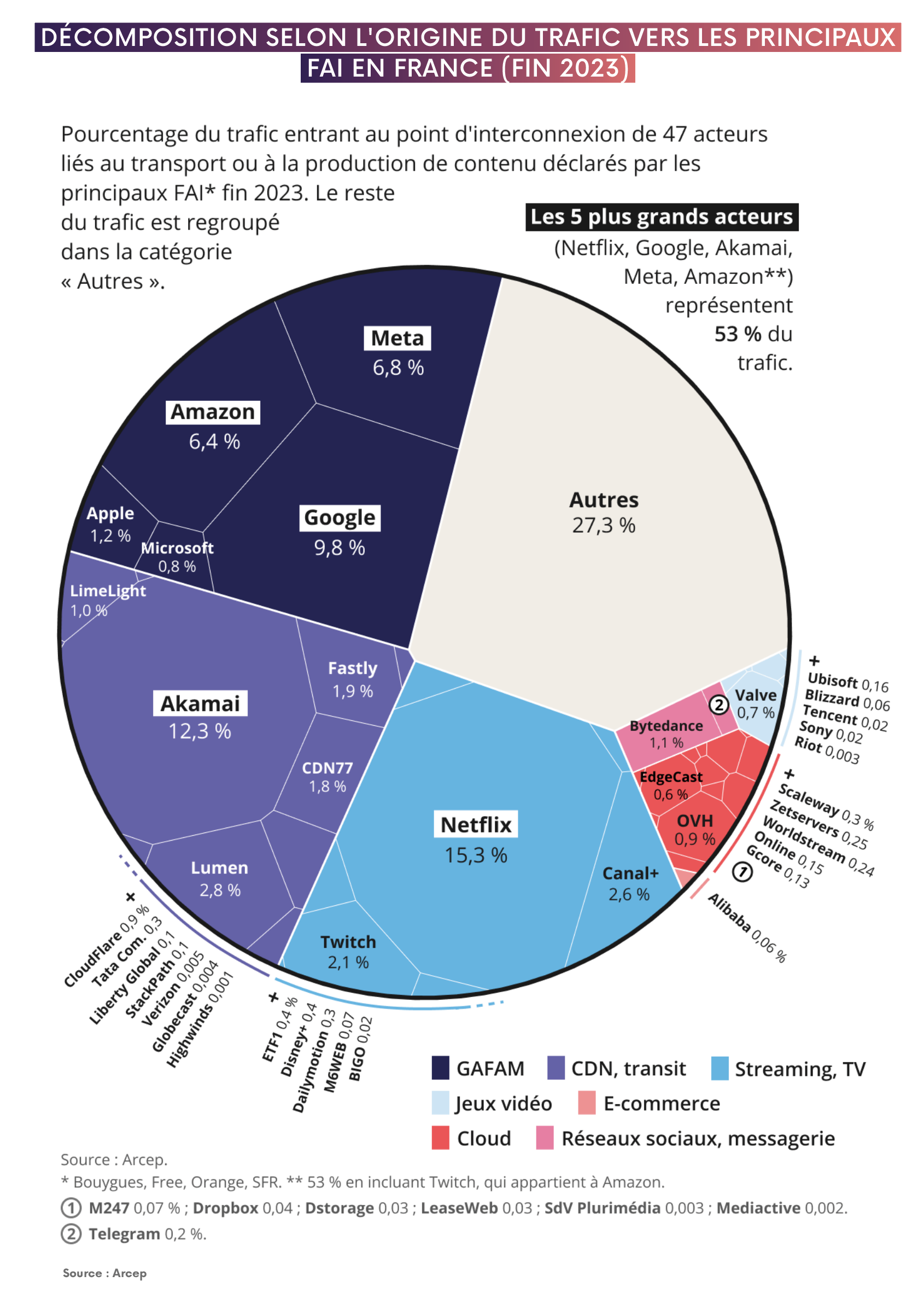Report: Big tech players 53% of France internet traffic
July 5, 2024

Arcep, the French regulatory body, has presenting the 2024 edition of its report on the state of the internet in France. This is Volume 3 of the annual report that the Authority submits to the country’s Parliament each year.
The report provides an account of the actions that Arcep has taken to safeguard the smooth running of the internet, and to ensure that it continues to develop as a common good. It also provides new data thanks to updates of its barometers of data network interconnection and the transition to IPv6.
Inbound traffic continued to increase in 2023
At the end of 2023, inbound traffic at IXPs in France is estimated at 46.5 Tbit/s, marking a 7.6 per cent increase compared to 2022 (vs +21 per cent between the end of 2021 and the end of 2022). Around 53 per cent of this traffic comes from five Big Tech companies: Netflix, Akamai, Facebook, Google and Amazon. The expansion of cache servers in telecom operators’ on-net content delivery networks (CDN) continues, creating the ability to optimise traffic relayed via interconnection: 20 per cent of inbound traffic to end users is routed via CDNs.
In 2023, the number of SVoD daily users decreased from 9.4 million in 2022 to 8.9 million. SVoD penetration rate rmained stable at around 56 per cent. SVoD consuming is still dominated by Netflix.

Ongoing transition to IPv6
Arcep notes that the transition to IPv6 has become imperative to prevent the internet from being split into two: IPv4 on the one side and IPv6 on the other. The Barometer of the transition to IPv6 is updated with data collected by Arcep and Afnic up to the end of 2023. ISPs’ transition to IPv6 continues apace: as mid-2023, 81 per cent of residential fixed access customers (FttH, cable, ADSL) and 66 per cent of mobile customers were enabled, albeit with sizeable disparities between providers. Although web and mail hosting companies still lag behind, they have made clear strides, with IPv6-enabled domain names increasing by six points, and IPv6 enabled email addresses doubling over the past year, going from 8 per cent to 19 per cent between mid-2022 and mid-2023.
Of the 100 countries with the most internet users, France ranks third in IPv6 adoption, with a combined residential and business adoption rate estimated at 64.6 per cent in April 2024, behind India (71.2 per cent) and Malaysia (65.5 per cent).
Net neutrality
In April 2023, the European Commission published its latest report assessing the implementation of open internet access, and underscoring this regulation’s positive contribution to supporting an open and innovative environment, and protecting users’ rights. In her editorial for this annual report, the Arcep Chair Laure de La Raudière spoke of her commitment to Net neutrality, which Arcep continues to safeguard. In 2023, the Wehe traffic prioritisation app – which Arcep makes available to the public as part of its data-driven regulation tools – made it possible for users to run more than 13,000 tests in France, bringing the total to 680,000 since its launch. Reports received on the J’alerte l’Arcep platform created the ability to detect a malfunction between an ISP and a content provider regarding users’ access to emails.
Cloud computing, data, gatekeeper platforms
Entering into force in May 2024, the Act on safeguarding and regulating cyberspace entrusts Arcep with new regulatory responsibilities, first in the cloud computing market, in preparation for Europe’s Data Act and, second, with respect to data intermediaries, in accordance with the Data Governance Act.
In addition, Arcep is involved in the implementation of the Digital Markets Act within BEREC and is co-chair of the ad hoc working group devoted to the task. Arcep also represents BEREC in the High-Level working group created by the regulation – which has included Arcep co-managing BEREC’s work on instant messaging services’ interoperability obligations, and on the opinion that BEREC issued on the draft reference offer for the interoperability of WhatsApp.
Digital sustainability
Since May 17th, digital sector players have also had access to the General policy framework for the ecodesign of digital services to reduce the environmental footprint of their websites, software, video planforms, AI chatbots, etc. Published by Arcep and Arcom, in concert with ADEME, this document contains 78 factsheets for the development of more eco-friendly services. This voluntary framework, established in collaboration with DINUM, CNIL and Inria, enables stakeholders to deliver an ongoing account of their efforts in the form of an Ecodesign declaration of conformity.
Measuring quality of service
The ‘Access ID card’ API was designed to be installed on ISPs’ home routers to achieve more reliable speed test comparisons. This API provides speed testing tools with information on the internet connection running the test (technology used, headline speed, simultaneous traffic, etc.), thereby enabling them to take those factors into account. All of ISPs’ new routers are now outfitted with this API. In January 2024, Nperf became the first speed test to use the API’s data in its publications.
Other posts by :
- SpaceX gets a portion of India
- TerreStar wants to build LEO network
- Musk: “No Starlink phone”
- Russia accused of eavesdropping on satellites
- FCC welcomes Musk’s 1m satellite plan
- Telesat has problems with an LEO
- Orbital debris a real danger
- India boosts space budget
- Blue Origin drops passenger flights
